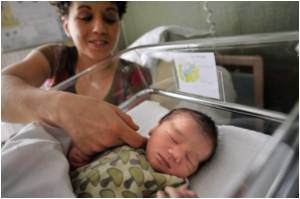Getting too little or too much sleep in early pregnancy is associated with elevated blood pressure in the third trimester, a new study has said.

Results show that the mean systolic blood pressure in the third trimester was 114 mm Hg in women with a normal self-reported nightly sleep duration of nine hours in early pregnancy, 118.05 mm Hg in women who reported sleeping six hours or less per night, and 118.90 mm Hg in women with a nightly sleep duration of 10 hours or more in early pregnancy.
After adjustments for potential confounders such as age, race and pre-pregnancy body mass index, mean systolic blood pressure was 3.72 mm Hg higher in short sleepers and 4.21 mm Hg higher in long sleepers. Similar results also were found for diastolic blood pressure.
According to the National Heart, Lung, and Blood Institute, systolic blood pressure - the top number in a blood pressure reading - is the force of blood in the arteries as the heart beats. A systolic blood pressure reading is considered to be "high" if it is 140 or more millimeters of mercury.
The study involved 1,272 healthy, pregnant women who completed a structured interview at 14 weeks gestation, on average. Sleep duration in early pregnancy was evaluated by the question, "Since becoming pregnant, how many hours per night do you sleep?"
Only about 20.5 percent of women reported a sleep duration of nine hours per night, which was used as the "normal" reference category because prior research indicates that pregnant women tend to have longer sleep duration patterns.
Advertisement
According to the authors, a number of mechanisms by which habitual short sleep duration may lead to increased blood pressure have been proposed. Because blood pressure is known to dip by an average of 10 to 20 percent during sleep, short sleep durations may raise the average 24-hour blood pressure and heart rate.
Advertisement
The authors suspect that the association between long sleep duration and elevated blood pressures may be related to unmeasured confounders such as obstructive sleep apnea, epression or insulin resistance.
Principal investigator and lead author Dr. Michelle A. Williams, professor of epidemiology in the School of Public Health at the University of Washington and co-director of the Center for Perinatal Studies at Swedish Medical Center in Seattle, Wash, advises pregnant women and women who are planning to become pregnant to develop healthy habits that promote sufficient sleep.
The study has been published in the journal Sleep.
Source-ANI















